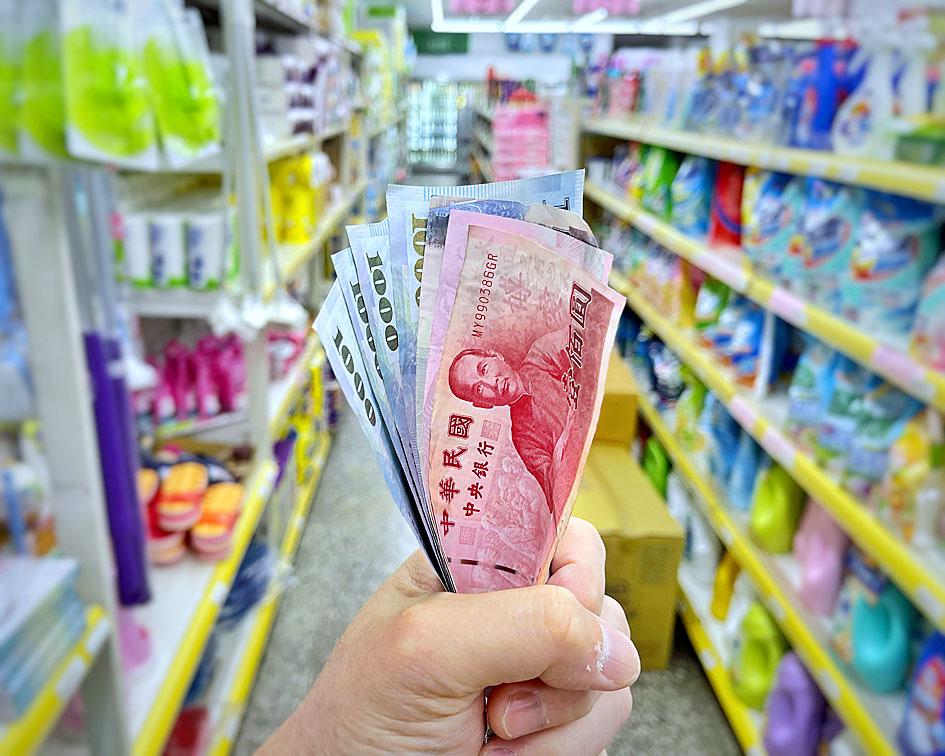The Chung-Hua Institution for Economic Research (CIER, 中華經濟研究院) yesterday raised its forecast for Taiwan’s GDP growth for this year from 5.16 percent to 5.84 percent on stronger exports, and urged policymakers to heed inflationary pressures spurred by a global economic recovery and loose monetary policies.
The plea came after the government announced a minimum wage hike of 5 percent from next year, and retailers and restaurants increased prices to reflect soaring oil, raw material and labor costs.
The latest growth projection is the highest in 11 years as Taiwan has been benefiting from a surge in demand for electronics amid trends toward remote working and distance learning amid COVID-19 restrictions.

Photo: CNA
The Taipei-based think tank said that the consumer price index (CPI) would rise to 1.84 percent this year, reversing a 0.24 percent contraction last year, when border controls were installed, halting almost all non-resident arrivals.
That would suggest a gain of 2.08 percentage points, higher than the central bank’s 2 percent alarm for monetary tightening.
“Policymakers should pay attention to inflation,” CIER president Chang Chuang-chang (張傳章) said. “While the issue is not yet serious, it is a focus of conversation.”
Many have complained about feeling the pinch and voiced concern that the situation might get out of control, Chang said.
An ongoing global economic recovery has pushed international oil and raw material prices higher, while supply deficiencies are also fueling the problem, the CIER said.
Concern over inflation might translate into reality, so the government had better be prepared, Chang said.
Cathay United Bank (國泰世華銀行) lead economist Lin Chi-chao (林啟超) said that climate change is adding to inflation worries.
This winter might be harsh, bolstering demand for coal and natural gas, Lin said.
That is why China has introduced power rationing to cope with energy shortages, Lin said, adding that snow fell in Japan’s Hokkaido Prefecture on Sunday, 17 days earlier than last year.
International fuel and commodity price hikes have played a big part in Taiwan’s CPI expansion, so the government must not take the situation lightly, he said.
Lin Chang-ching (林常青), who teaches economics at National Cheng Kung University, said that inflation in Taiwan does not look like it will be a short-term phenomenon, possibly persisting through the third quarter of next year.
Housing prices, although not a component of CPI, have picked up drastically in Tainan and would fan inflation expectations, he said.

Intel Corp chief executive officer Lip-Bu Tan (陳立武) is expected to meet with Taiwanese suppliers next month in conjunction with the opening of the Computex Taipei trade show, supply chain sources said on Monday. The visit, the first for Tan to Taiwan since assuming his new post last month, would be aimed at enhancing Intel’s ties with suppliers in Taiwan as he attempts to help turn around the struggling US chipmaker, the sources said. Tan is to hold a banquet to celebrate Intel’s 40-year presence in Taiwan before Computex opens on May 20 and invite dozens of Taiwanese suppliers to exchange views

Application-specific integrated circuit designer Faraday Technology Corp (智原) yesterday said that although revenue this quarter would decline 30 percent from last quarter, it retained its full-year forecast of revenue growth of 100 percent. The company attributed the quarterly drop to a slowdown in customers’ production of chips using Faraday’s advanced packaging technology. The company is still confident about its revenue growth this year, given its strong “design-win” — or the projects it won to help customers design their chips, Faraday president Steve Wang (王國雍) told an online earnings conference. “The design-win this year is better than we expected. We believe we will win

Chizuko Kimura has become the first female sushi chef in the world to win a Michelin star, fulfilling a promise she made to her dying husband to continue his legacy. The 54-year-old Japanese chef regained the Michelin star her late husband, Shunei Kimura, won three years ago for their Sushi Shunei restaurant in Paris. For Shunei Kimura, the star was a dream come true. However, the joy was short-lived. He died from cancer just three months later in June 2022. He was 65. The following year, the restaurant in the heart of Montmartre lost its star rating. Chizuko Kimura insisted that the new star is still down

While China’s leaders use their economic and political might to fight US President Donald Trump’s trade war “to the end,” its army of social media soldiers are embarking on a more humorous campaign online. Trump’s tariff blitz has seen Washington and Beijing impose eye-watering duties on imports from the other, fanning a standoff between the economic superpowers that has sparked global recession fears and sent markets into a tailspin. Trump says his policy is a response to years of being “ripped off” by other countries and aims to bring manufacturing to the US, forcing companies to employ US workers. However, China’s online warriors